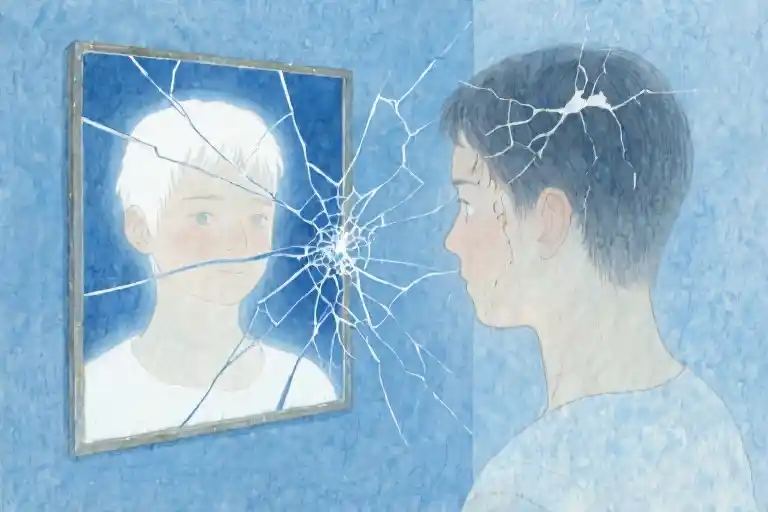The other night, I found myself pacing my apartment at 3 AM having an intense debate about existential philosophy… in my best (read: terrible) Batman voice. This wasn’t some creative exercise – just another episode of my brain’s late-night talk show where I’m both host and unwilling audience. As the gravelly voice echoed off my diploma-filled walls (yes, the PhD hangs right next to my Amazon Prime membership certificate), it hit me: we’re all puppets to our own bizarre, unconscious rituals.
That framed doctorate peering over my shoulder? Currently serving as a $120,000 bookmark in a cardboard box labeled ‘Academic Achievements & Winter Clothes.’ The irony isn’t lost on me – seven years of research, hundreds of pages written, all condensed into a document that now protects my sweaters from moths. Yet somehow, stepping on sidewalk pebbles in perfect alternating symmetry still feels more purposeful than that degree ever did.
We’ve all got these quirks – the mental autopilot routines that make perfect sense in the moment but crumble under scrutiny. Maybe you alphabetize your spice rack during Zoom meetings. Perhaps you’ve developed an elaborate system for eating M&Ms by color. These harmless rituals become concerning when scaled up to life choices: pursuing advanced degrees because ‘it’s the next step,’ staying in unfulfilling careers waiting for some magical moment of clarity, or in my case, writing 80,000 words about medieval literature while developing a nervous tick from excessive coffee consumption.
Here’s what my boxed PhD and your weirdest habit have in common: they’re symptoms of operating without examining our deeper motivations. That voice in your head insisting you need another certification? Probably the same one convincing you that the left shoelace must be tied exactly three milliseconds before the right. We become so focused on the ‘how’ of our actions that we never stop to ask ‘why’ – until we’re standing in our Batman pajamas, holding a diploma that feels about as useful as a screen door on a submarine.
The real tragedy isn’t the wasted time or money (though my student loan officer would disagree). It’s how these unconscious patterns steal our ability to make intentional choices about what matters. When we don’t clarify our motivations, we default to society’s ready-made scripts: more education = good, busy = productive, suffering = noble. Meanwhile, our actual values get buried under layers of ‘shoulds’ and ‘supposed tos’ like some psychological landfill.
So here’s your first assignment, fellow overthinker: next time you catch yourself mid-ritual – whether it’s reorganizing your desktop icons for the third time today or considering another degree program – hit pause. Ask yourself the Batman question: ‘What’s my why?’ (Bonus points if you do the voice). The answer might surprise you. Mine certainly did when I realized I’d pursued academia not for love of knowledge, but because being ‘Dr. Lastname’ felt like armor against imposter syndrome. Turns out, no amount of Latin honors can silence that particular critic.
That cardboard box in my closet? It’s become my personal memento mori – not for death, but for misguided ambition. Every time I reach for a winter scarf, I get a reminder: without conscious intention, even our grandest achievements risk becoming beautifully wrapped packages of empty calories for the soul. The good news? Unlike my questionable thesis on 14th-century sonnets, it’s never too late to start examining what truly drives your choices.
The Museum of Modern Absurdities
1.1 The Academic Hamster Wheel
We’ve all been there – that moment when you catch yourself knee-deep in another degree application while secretly wondering why you’re doing this. The academic hamster wheel spins faster each year, yet we keep jumping back on with the enthusiasm of deranged cartoon squirrels chasing invisible nuts.
Take my PhD journey as a cautionary tale. What began as genuine curiosity about [insert obscure research topic] somehow morphed into a decade-long odyssey that left me with three things: a permanent caffeine tremor, the ability to cite sources in my sleep, and a fancy diploma currently serving as excellent drawer liner in my Ikea dresser. The employment statistics for humanities doctorates tell the real story – only 23% land tenure-track positions according to recent MLA data, while the rest of us become overqualified baristas or professional LinkedIn ghostwriters.
This isn’t just about advanced degrees though. The same compulsive energy drives people to collect certifications like Pokémon cards – CPA, CFA, PMP – stacking alphabets after their names while their bank accounts whisper “why?” It’s what psychologists call “credentialism,” where we mistake symbols of achievement for actual purpose. Like decorating a Christmas tree with nothing underneath.
1.2 The Quirky Rituals of Daily Life
Now let’s examine the smaller absurdities – those inexplicable personal rituals we perform with dead seriousness. My personal favorite? The sacred dance of Pebble Stepping. When my right foot grazes a stone, some ancient circuitry in my lizard brain demands immediate symmetrical satisfaction for the left. Failure to comply results in lingering existential discomfort disproportionate to the cosmic significance of uneven footfeel.
You’ve got your own versions, don’t you? Maybe it’s:
- Rearranging grocery items into color gradients while waiting in line
- Counting sidewalk cracks in multiples of seven
- Rewriting emails seventeen times only to send the first draft
These micro-obsessions form what anthropologists call “personal mythologies” – meaningless behaviors we imbue with sacred significance. They’re harmless until they become avoidance strategies for bigger questions. (Fun experiment: Next time you catch yourself alphabetizing spice racks, ask “What life decision am I avoiding right now?”)
Reader Intermission
What’s your most delightfully absurd daily ritual? Share in the comments – let’s crowdsource the modern human condition. Best submission gets a virtual high-five and my unused PhD thesis as bedtime reading material.
The connective tissue between these academic and everyday behaviors? They’re both symptoms of what I’ve diagnosed as “Purpose Deficit Disorder” – the 21st century malaise of motion without meaning. In the next section, we’ll dissect why otherwise intelligent people keep chasing invisible finish lines. (Spoiler: Your brain’s been lying to you.)
The Anatomy of Meaningless Behaviors
2.1 The Dopamine Deception
Our brains are remarkably efficient at tricking us into repeating useless behaviors. That fleeting sense of accomplishment when collecting another academic credential? That’s your reward system firing up for what neuroscientists call ‘false achievement markers.’
Consider this: completing arbitrary tasks (like stepping on matching pebbles or accumulating degrees) triggers the same dopamine release as meaningful accomplishments. Our neurology doesn’t distinguish between writing a novel and alphabetizing your spice rack – both register as ‘completed tasks.’ This biological glitch explains why we can spend years chasing hollow victories while ignoring our existential crisis.
The Pattern Recognition Trap:
- Brain seeks completion signals (thesis submitted = dopamine hit)
- Creates addiction to ‘productive feeling’ regardless of actual value
- Leads to ‘achievement stacking’ without purpose (see: LinkedIn badge collectors)
2.2 The Social Script Handcuffs
We’ve been culturally programmed since kindergarten to follow the ‘good student’ trajectory: study hard → get grades → repeat. By adulthood, this transforms into career autopilot. The terrifying truth? Most degree-chasing behaviors are just grown-up versions of gold-star addiction.
The Education-Industrial Complex:
| Childhood Conditioning | Adult Manifestation |
|---|---|
| Perfect attendance awards | LinkedIn ‘streaks’ |
| Honor roll obsession | Alphabet soup after your name |
| Teacher’s pet status | Networking for validation |
This explains why so many high-achievers feel empty after checking all society’s boxes – we mistook the map (degree milestones) for the territory (a meaningful life).
2.3 Existential Avoidance 101
Here’s where Jean-Paul Sartre’s concept of ‘bad faith’ punches us in the gut: we choose meaningless pursuits because confronting true freedom is terrifying. It’s easier to:
- Pretend we ‘have to’ get certain credentials
- Blame ‘the system’ for our choices
- Hide behind busywork rather than define personal meaning
The Existential Cost Calculator:
- 5 years PhD = 1,825 days avoiding self-definition
- $120,000 student debt = Price tag for postponing authenticity
- 1 cardboard degree box = Physical proof of avoidance
What makes this particularly brutal for writers? We’re professional meaning-makers who often fail to apply that skill to our own lives. The same brain that crafts compelling narratives for characters defaults to ‘because I should’ when justifying our own choices.
Breaking the Trance:
Next time you catch yourself:
- Automatically researching another degree program
- Organizing your bookshelf instead of writing
- Calculating how many peer-reviewed papers equal ‘success’
…ask this Sartre-approved question: “Am I acting from freedom or habit?” The discomfort you feel? That’s your authentic self waking up.
3. The Emergency Guide to Motivation Clarity
3.1 The 5-Minute Writing Motive Purity Test
Let’s start with a quick diagnostic before we dive deeper. Grab a timer and answer these questions honestly – no one’s judging, not even that inner critic who sounds suspiciously like your high school English teacher:
- The Anonymity Challenge: If your work could only be published anonymously forever, would you still write it?
- Yes (+20% intrinsic motivation) → You’re writing for the craft itself
- No (Trigger Why Chain below)
- The Desert Island Scenario: If stranded alone with no chance of rescue, would you continue writing in coconut juice on palm leaves?
- Yes (+30% authentic drive) → Writing is your oxygen
- No (Possible validation-seeking behavior detected)
- The Legacy Question: When imagining your epitaph, which stings more:
- “They never finished their novel”
- “They never went viral”
This isn’t some corporate personality quiz – it’s a mirror. Notice where your gut clenches. That discomfort? That’s where your real “why” hides.
3.2 Building Your Anti-Burnout Immune System
Now that we’ve identified the weak spots, let’s fortify your creative psyche with three vaccination shots:
Shot 1: The Value Compass
- List 10 things you’d defend in an argument (e.g., “Oxford commas matter” counts)
- Circle 3 that make your face flush with passion
- Congratulations – you’ve found your writing non-negotiables
Shot 2: The Motivation Layer Cake
| Layer | Example | Sustainability |
|---|---|---|
| Frosting | “Get famous” | Melts fast |
| Filling | “Help anxious teens” | Lasts longer |
| Sponge | “Writing feels like breathing” | Never expires |
Shot 3: The BS Force Field
Create a “creative will” document that answers:
- What trends will I never chase? (TikTok book reviews?)
- What compliments make me suspicious? (“Your voice is so marketable!”)
- What criticism actually helps? (Only you know this)
3.3 The Sunk Cost Stoplight Algorithm
Time for some tough love math. Calculate your:
Red Light (Full Stop)
= (Hours invested) ÷ (Joy units*) < 0.5
*Measure in “Did this writing session feel like Christmas morning or jury duty?”
Yellow Light (Proceed with Caution)
When your “why” file contains more “shoulds” than “musts”
Green Light (Accelerate)
When strangers’ opinions taste like background noise
Remember that PhD in a box? Here’s what it taught me about creative work: Detours only become wasted time if we refuse to read the road signs. Your weird pebble-stepping habit? That’s just your soul trying to find balance. Now that you’ve got these tools, which false path are you ready to step off?
The Final Wake-Up Call: From Absurdity to Clarity
That moment when you catch yourself debating existentialism in a Batman voice at 3 AM? That’s your wake-up call. The dusty PhD box under your bed? Another one. These aren’t just quirky personality traits or regrettable life choices – they’re flashing neon signs pointing to a fundamental question: What behaviors are you ready to stop autopiloting through?
Three Exit Routes from Absurdistan
- The Emergency Toolkit (For Immediate Relief)
Grab our free Anti-Aimless Living Starter Pack:
- Motivation Detox Worksheet: Identify which of your current projects actually align with your values (spoiler: your unfinished novel counts, that random certification course might not)
- The Pebble-Stopper Guide: Break compulsive behaviors using cognitive behavioral techniques adapted for creative minds
- PhD-to-USD Calculator: A dark-humored tool showing what your degree could’ve earned if invested in Bitcoin instead (for therapeutic crying purposes only)
- The Slow Escape Plan (For Systematic Change)
Subscribe to The Recovering Overachiever newsletter for:
- Weekly “Why Checks”: Simple prompts to audit your motivations (e.g., “Am I writing this article because I care or because Medium algorithms told me to?”)
- Interviews with reformed “degree collectors” and “hobby hoarders”
- Access to our Existential Crisis Hotline (Actually just a Discord server full of people equally lost but trying)
- The Nuclear Option (For The Brave)
Join our 30-Day Behavior Autopsy Challenge where you’ll:
- Document one meaningless daily ritual (yes, counting sidewalk cracks qualifies)
- Trace its origins (Mom’s obsession with straight A’s? Social media comparison?)
- Conduct a ceremonial “burial” of that habit (bonus points for dramatic eulogies delivered in your best cartoon squirrel voice)
Your Turn at the Microscope
That pebble-stepping quirk? The half-finished manuscript gathering dust? The LinkedIn profile with more credentials than common sense? They’re all specimens waiting for your examination.
So here’s the final question – the one that’ll determine whether this article becomes another forgotten tab or the start of something real:
Which of your absurd behaviors are you ready to dissect first?
(Pro tip: Start with the one that just popped into your head while reading this. That’s your brain waving a white flag.)





